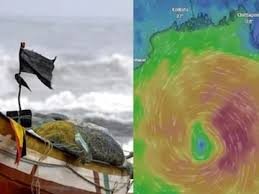Cyclone Fengal: Heavy Rains Predicted for Tamil Nadu
Cyclone Fengal has recently formed over the Bay of Bengal, and it is expected to bring heavy rainfall and severe weather conditions to Tamil Nadu. According to the India Meteorological Department (IMD), the cyclone is likely to intensify further and cause widespread rainfall across the southern region of India. The cyclone’s impact is projected to affect several districts, particularly those along the coast. Authorities have issued advisories and warnings to prepare for potential flooding and storm surges. The government is on high alert, coordinating rescue and relief operations.
The cyclone is expected to bring heavy rainfall, especially to coastal and southern Tamil Nadu. Several regions have been put under alert, including Chennai and surrounding areas. Fishermen have been advised not to venture into the sea due to rough conditions. The IMD’s early warnings are crucial in reducing the potential loss of life and property, enabling timely evacuations and disaster management.

Why This News is Important
Impact on Public Safety and Infrastructure
Cyclone Fengal’s impending arrival is a cause for concern as it could result in significant damage to infrastructure, particularly in coastal areas. Strong winds and heavy rains could lead to uprooted trees, fallen power lines, and damaged buildings. Schools, offices, and public transportation services may also be disrupted, impacting daily life and economic activities. By highlighting the news, the public is alerted to take necessary precautions and avoid unnecessary risks.
Importance of Early Weather Forecasting
The timely prediction of Cyclone Fengal by the IMD is a testament to the advancements in meteorological technology. Early warning systems have saved countless lives in the past by enabling the authorities to make early evacuations and implement safety measures. This development also underscores the significance of maintaining and improving forecasting systems to protect vulnerable populations during extreme weather events.
Relevance for Disaster Management
Cyclones such as Fengal highlight the importance of efficient disaster management strategies in India, particularly for states like Tamil Nadu, which are frequently affected by tropical storms. Understanding how the government plans to deploy resources, including emergency personnel and supplies, is essential for public safety and resilience in the face of such calamities.
Historical Context: Cyclones in Tamil Nadu
Tamil Nadu has a long history of being impacted by tropical cyclones due to its geographical location on the eastern coast of India. The Bay of Bengal, where Cyclone Fengal originated, is one of the most cyclone-prone regions in the world. Over the years, the state has faced numerous cyclonic storms, some of which have caused extensive damage. The most devastating cyclones include the 1964 Chennai Cyclone, the 2011 Vardah Cyclone, and more recently, Cyclone Gaja in 2018.
These cyclones have brought attention to the importance of improving weather forecasting, infrastructure resilience, and disaster preparedness. Tamil Nadu, along with other coastal states, has progressively strengthened its cyclone disaster management strategies. This includes building cyclone shelters, improving communication networks for faster dissemination of warnings, and enhancing evacuation plans.
Key Takeaways from Cyclone Fengal: Heavy Rains Predicted for Tamil Nadu
| S. No. | Key Takeaway |
|---|---|
| 1 | Cyclone Fengal is expected to bring heavy rainfall to Tamil Nadu, especially along the coast. |
| 2 | The IMD has issued warnings for several districts, advising fishermen to avoid venturing into the sea. |
| 3 | Authorities are on high alert, preparing for potential flooding and storm surges. |
| 4 | Cyclone Fengal’s intensity may lead to disruptions in public transport and infrastructure. |
| 5 | The government’s early warnings and disaster management plans are crucial for minimizing the impact. |
Important FAQs for Students from this News
1. What is Cyclone Fengal?
Cyclone Fengal is a tropical cyclone that has formed over the Bay of Bengal, bringing heavy rains and severe weather conditions to Tamil Nadu and nearby regions.
2. Which areas in Tamil Nadu are likely to be most affected by Cyclone Fengal?
Coastal districts, including Chennai and surrounding areas, are expected to face the brunt of Cyclone Fengal’s impact with heavy rains and strong winds.
3. What precautions are advised for the public during Cyclone Fengal?
Authorities have advised people to stay indoors, avoid coastal areas, and follow updates from the India Meteorological Department (IMD). Fishermen are strictly warned against venturing into the sea.
4. Why is Tamil Nadu prone to cyclones?
Tamil Nadu’s eastern coast lies along the Bay of Bengal, a cyclone-prone area, making it vulnerable to tropical storms, particularly during the monsoon and post-monsoon seasons.
5. What steps have authorities taken to manage Cyclone Fengal?
The government has issued advisories, activated disaster response teams, and prepared shelters for evacuation in vulnerable areas to mitigate the cyclone’s impact.
Some Important Current Affairs Links

















